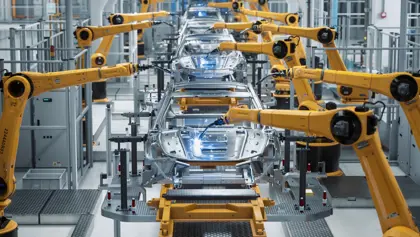Dive into
Modernizing Manufacturing Resources
Maximizing Productivity, Efficiency, and Profits Through Industry 4.0
Unlock the Potential of Factory 4.0—A Comprehensive Guide

What to Expect from Factory 4.0
Factory 4.0 is the next evolution in manufacturing, bringing together digital technologies like IoT, big data, AI, and automation to create smarter, more efficient factories. The impact of these advancements goes beyond productivity—they also transform how manufacturers make decisions, optimize supply chains, and ensure sustainability.
Due to your cookie preferences, we cannot show you this content. Accept the cookies to be able to view this content.

One of the most significant advantages of Factory 4.0 is the ability to move away from manual decision-making processes and embrace data-driven insights. With IoT sensors and big data analytics, manufacturers can gather vast amounts of information and use it to optimize operations in real time. Gone are the days of guessing whether to increase capacity—now decisions are based on accurate, actionable data.
Factory 4.0 technologies allow manufacturers to be more flexible. For example, if you need additional computing power at the end of the month to process MRP and MPS data, you can scale up instantly without major hardware investments. This flexibility allows businesses to adapt quickly to changing demands.
With more data, sensors, and automation in place, manufacturers can significantly improve product quality. Robotics and automation handle repetitive tasks with precision, reducing errors and increasing consistency. Quality data can be fed into models that optimize production and ensure high standards are met throughout the process.
In the wake of disruptions like COVID-19, single-source supply chains are no longer viable. Factory 4.0 enables real-time monitoring of the supply chain, allowing manufacturers to identify potential disruptions early and pivot to alternative suppliers. This resilience ensures that production continues smoothly, even in challenging situations.
Factory 4.0 is also driving a transformation in the workforce. As more tasks become automated, employees can focus on higher-level decision-making and oversight. Tribal knowledge is replaced by digital systems that store and share critical information, making it easier for new team members to get up to speed.
As manufacturers move to cloud-based solutions, cybersecurity becomes a top priority. Cloud providers like Microsoft offer robust security measures to protect data as it moves between factories, suppliers, and customers. Additionally, by leveraging the cloud, businesses can scale their operations without major capital investments in hardware.
Factory 4.0 technologies also promote sustainability by optimizing resource use, reducing waste, and improving energy efficiency. This focus on sustainability not only benefits the environment but also gives manufacturers a competitive edge, allowing them to appeal to environmentally conscious customers and partners.
One of the most powerful tools in Factory 4.0 is predictive analytics. By analyzing patterns in data, manufacturers can predict future trends and take proactive measures to capitalize on opportunities or mitigate risks. Whether it's avoiding supply chain disruptions or optimizing production schedules, predictive analytics help businesses stay ahead of the curve.
Factory 4.0 is transforming manufacturing, offering businesses increased efficiency, flexibility, and the ability to make data-driven decisions. By embracing these technologies, manufacturers can stay competitive, reduce costs, and improve sustainability.
Dive into
Modernizing Manufacturing Resources
We, and third parties, use cookies on our website. We use cookies to keep statistics, to save your preferences, but also for marketing purposes (for example, tailoring advertisements). By clicking on 'Settings' you can read more about our cookies and adjust your preferences. By clicking 'Accept all', you agree to the use of all cookies as described in our privacy and cookie policy.
Purpose
This cookie is used to store your preferences regarding cookies. The history is stored in your local storage.
Cookies
Location of Processing
European Union
Technologies Used
Cookies
Expiration date
1 year
Why required?
Required web technologies and cookies make our website technically accessible to and usable for you. This applies to essential base functionalities such as navigation on the website, correct display in your internet browser or requesting your consent. Without these web technologies and cookies our website does not work.
Purpose
These cookies are stored to keep you logged into the website.
Cookies
Location of Processing
European Union
Technologies Used
Cookies
Expiration date
1 year
Why required?
Required web technologies and cookies make our website technically accessible to and usable for you. This applies to essential base functionalities such as navigation on the website, correct display in your internet browser or requesting your consent. Without these web technologies and cookies our website does not work.
Purpose
This cookie is used to submit forms to us in a safe way.
Cookies
Location of Processing
European Union
Technologies Used
Cookies
Expiration date
1 year
Why required?
Required web technologies and cookies make our website technically accessible to and usable for you. This applies to essential base functionalities such as navigation on the website, correct display in your internet browser or requesting your consent. Without these web technologies and cookies our website does not work.
Purpose
This service provided by Google is used to load specific tags (or trackers) based on your preferences and location.
Why required?
This web technology enables us to insert tags based on your preferences. It is required but adheres to your settings and will not load any tags if you do not consent to them.
Purpose
This cookie is used to store your preferences regarding language.
Cookies
Why required?
We use your browser language to determine which language to show on our website. When you change the default language, this cookie makes sure your language preference is persistent.
Purpose
This service is used to track anonymized analytics on the HSO.com application. We find it very important that your privacy is protected. Therefore, we collect and store this data anonymously on our own servers. This cookie helps us collect data from HSO.com so that we can improve the website. Examples of this are: it allows us to track engagement by page, measuring various events like scroll-depth, time on page and clicks.
Cookie
Purpose
With your consent, this website will load Google Analytics to track behavior across the site.
Cookies
Purpose
With your consent, this website will load the Google Advertising tag which enables HSO to report user activity from HSO.com to Google. This enables HSO to track conversions and create remarketing lists based on user activity on HSO.com.
Possible cookies
Please refer to the below page for an updated view of all possible cookies that the Google Ads tag may set.
Cookie information for Google's ad products (safety.google)
Technologies Used
Cookies
Purpose
With your consent, we use IPGeoLocation to retrieve a country code based on your IP address. We use this service to be able to trigger the right web technologies for the right people.
Purpose
With your consent, we use Leadfeeder to identify companies by their IP-addresses. Leadfeeder automatically filters out all users visiting from residential IP addresses and ISPs. All visit data is aggregated on the company level.
Cookies
Purpose
With your consent, this website will load the LinkedIn Insights tag which enables us to see analytical data on website performance, allows us to build audiences, and use retargeting as an advertising technique. Learn more about LinkedIn cookies here.
Cookies
Purpose
With your consent, this website will load the Microsoft Advertising Universal Event Tracking tag which enables HSO to report user activity from HSO.com to Microsoft Advertising. HSO can then create conversion goals to specify which subset of user actions on the website qualify to be counted as conversions. Similarly, HSO can create remarketing lists based on user activity on HSO.com and Microsoft Advertising matches the list definitions with UET logged user activity to put users into those lists.
Cookies
Technologies Used
Cookies
Purpose
With your consent, this website will load the Microsoft Dynamics 365 Marketing tag which enables HSO to score leads based on your level of interaction with the website. The cookie contains no personal information, but does uniquely identify a specific browser on a specific machine. Learn more about Microsoft Dynamics 365 Marketing cookies here.
Cookies
Technologies Used
Cookies
Purpose
With your consent, we use Spotler to measures more extensive recurring website visits based on IP address and draw up a profile of a visitor.
Cookies
Purpose
With your consent, this website will show videos embedded from Vimeo.
Technologies Used
Cookies
Purpose
With your consent, this website will show videos embedded from Youtube.
Cookies
Technologies Used
Cookies
Purpose
With your consent, this website will load the Meta-pixel tag which enables us to see analytical data on website performance, allows us to build audiences, and use retargeting as an advertising technique through platforms owned by Meta, like Facebook and Instagram. Learn more about Facebook cookies here. You can adjust how ads work for you on Facebook here.
Cookies
Purpose
With your consent, we use LeadInfo to identify companies by their IP-addresses. LeadInfo automatically filters out all users visiting from residential IP addresses and ISPs. These cookies are not shared with third parties under any circumstances.
Cookies
Purpose
With your consent, we use TechTarget to identify companies by their IP address(es).
Cookies
Purpose
With your consent, we use this service provided by uMarketingSuite to run A/B tests across the HSO.com application. A/B testing (also called split testing) is comparing two versions of a web page to learn how we can improve your experience.
Purpose
With your consent, we use this service provided by uMarketingSuite to personalize pages and content across the HSO.com application. Personalization helps us to tailor the website to your specific needs, aiming to improve your experience on HSO.com.
Purpose
With your consent, we use ZoomInfo to identify companies by their IP addresses. The data collected helps us understand which companies are visiting our website, enabling us to target sales and marketing efforts more effectively.
Cookies